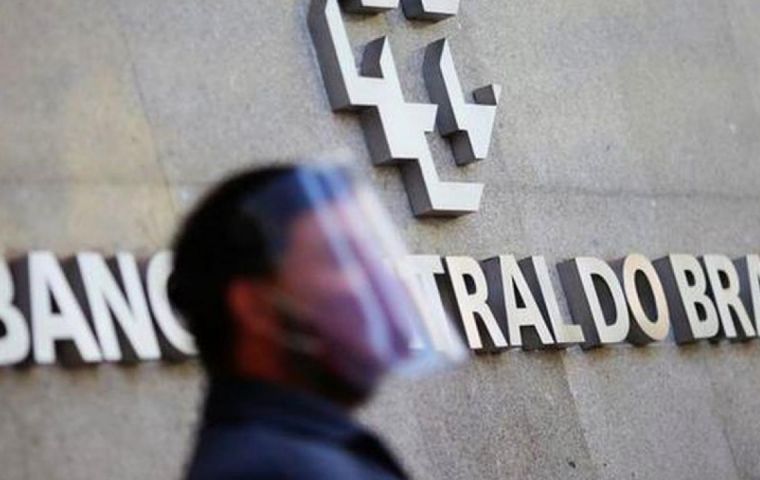MercoPress. South Atlantic News Agency
Brazil raises benchmark interest rate to 13,75%, and possibly more to come
 Since March 2021, the Brazilian central bank has rapidly raised the Selic from an all-time low of 2% introduced to stimulate the pandemic-battered economy
Since March 2021, the Brazilian central bank has rapidly raised the Selic from an all-time low of 2% introduced to stimulate the pandemic-battered economy Brazil's central bank raised its benchmark interest rate 50 basis points to a record 13,75%, (the highest since January 2017), anticipating that the tightening cycle, may not be over given the stubborn high domestic inflation and “adverse and volatile” global situation.
In its release on Wednesday d said that “the committee will evaluate the need for a residual adjustment of lesser magnitude at its next meeting” from September 20 to 21. “The external environment remains adverse and volatile, with larger downward revisions of the global economic growth outlook in an inflationary environment that is still under pressure,” it added. “The uncertainty of the current economic situation, both domestic and global... demands extra caution.”
COPOM also said the decision of the nine members committee was unanimous.
Since March 2021, the Brazilian central bank has rapidly raised the Selic from an all-time low of two percent, which it had introduced to stimulate the pandemic-battered economy. This included three hikes of 150 basis points from October 2021 to February 2022, followed by two one-percentage-point increases.
Annual inflation remains high in Brazil, at 11.89% in June -- way above the central bank's target of 3.5%. But analysts polled by the central bank forecast the inflation rate will fall to 7.15% by the end of the year.
COPOM members led by chairman Roberto Campos Neto are battling the impacts of fuel and food shocks that have kept consumer prices rising above 10% a year even as growth remains subdued. Recently, tax cuts provided short-term relief to transportation costs, and inflation has eased. On the other hand, congress passed a US$7.6 billion social aid package that’s expected to support demand while the labor market firms.
But the central bank is also facing calls to ease up on its hawkish rate increases, fearing a recession. “Since December, the real interest rate has been at a level that is inhibiting economic activity,” the chief economic analyst at Brazil's powerful National Confederation of Industry (CNI), Marcelo Azevedo, said in a recent statement. The CNI called Wednesday's hike “wrong.”
A 0.4-percent month-on-month fall in Brazilian industrial production in June and other “softer surveys” last month indicate the economy is losing steam, said William Jackson, chief emerging markets economist at consulting firm Capital Economics.
Analysts polled by the central bank forecast Brazil's GDP growth will come in at 1.97% for the year, after an expansion of 4.6% last year and a contraction of 3.9% in pandemic-stricken 2020. Brazil's economy grew by one percent in the first quarter, but experts warn the second half of the year looks bleaker.
With soaring prices for food and fuel hurting Brazilian families, the weak economy has become a major liability for President Jair Bolsonaro as he campaigns for reelection this October. The latest public opinion polls show the incumbent twelve points behind ex president Lula da Silva




Top Comments
Disclaimer & comment rulesCommenting for this story is now closed.
If you have a Facebook account, become a fan and comment on our Facebook Page!